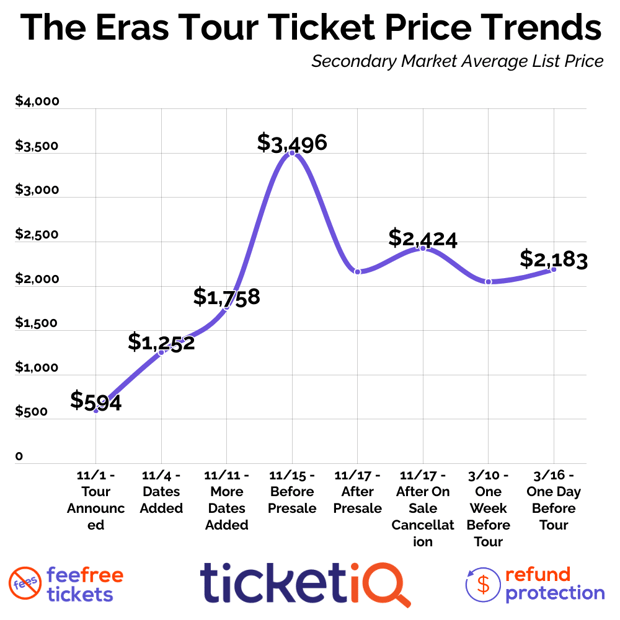Ticketmaster's Oasis Tour Ticket Sales: A Consumer Protection Law Audit

Table of Contents
2. Main Points:
2.1. The Scalping Problem and Ticketmaster's Role:
H3: The Prevalence of Bots and Automated Ticket Purchasing: The Oasis tour ticket sale was marred by the widespread use of ticket bots – automated software designed to circumvent Ticketmaster's security measures and purchase tickets en masse. These bots significantly reduced the number of tickets available to legitimate fans, driving up prices on the secondary market.
- Evidence of bot activity: Reports surfaced of thousands of tickets being purchased within seconds of the sale going live, far exceeding the purchasing capacity of individual fans.
- Impact on ticket availability: Many fans were left empty-handed, despite attempting to purchase tickets legitimately. The vast majority of tickets ended up in the hands of resellers, often at exorbitant prices.
- Lack of effective countermeasures: Ticketmaster's anti-bot measures proved insufficient, highlighting a significant failure to protect consumers from this form of scalping. This lack of effective countermeasures against ticket bots and automated ticket purchasing leaves consumers vulnerable.
H3: Ticketmaster's Dynamic Pricing and its Ethical Implications: Ticketmaster employs a dynamic pricing model, where ticket prices fluctuate based on demand. While this is a common practice, its application during the Oasis tour raised concerns about price gouging and consumer exploitation. The high demand, coupled with the limited supply (partially due to bot activity), led to prices soaring far beyond what many fans considered reasonable.
- Examples of fluctuating prices: Reports showed significant price variations for the same seats within a short period, suggesting an opportunistic approach to pricing.
- Comparisons to fixed pricing models: A fixed pricing model, while potentially less profitable for Ticketmaster, would likely have resulted in fairer prices for consumers and a more equitable distribution of tickets.
- Discussion of consumer fairness: The use of dynamic pricing or surge pricing during high-demand events raises ethical questions about fairness and the potential for exploitation of consumers' enthusiasm.
H3: Ticketmaster's Responsibility in Combating Scalping: Ticketmaster has a responsibility to protect consumers from unfair pricing practices and the detrimental effects of scalping. Their failure to effectively prevent bot activity and manage dynamic pricing during the Oasis tour raises serious questions about their commitment to consumer welfare and their compliance with consumer protection regulations.
- Analysis of Ticketmaster's existing anti-scalping measures: While Ticketmaster claims to have measures in place, their effectiveness during the Oasis sale was clearly insufficient.
- Suggestions for improvement: Ticketmaster needs to significantly improve its anti-bot technology, explore alternative pricing models, and increase transparency regarding its pricing algorithms. Strengthening anti-scalping measures is crucial for fairer ticket resale practices.
- Regulatory compliance: A thorough review of Ticketmaster's Ticketmaster policies and their compliance with existing consumer protection laws is necessary.
2.2. Accessibility and Inclusivity Concerns:
H3: Website Crashes and Technical Difficulties: The sheer volume of traffic attempting to access Ticketmaster's website during the Oasis tour ticket sale overwhelmed the system, leading to widespread website crashes and significant delays. This negatively impacted all users, but disproportionately affected those with disabilities who may require more time and assistance to navigate online ticket purchasing.
- User experiences: Many users reported being unable to access the site, experiencing extended wait times, and ultimately failing to secure tickets.
- Impact on accessibility for disabled users: The website crashes and slow loading times presented significant barriers for users with disabilities, further limiting their access to tickets. This highlights a failure to meet accessibility for disabled users standards in online ticket sales.
- Frustration caused by technical problems: The technical difficulties caused widespread frustration and disappointment amongst fans, damaging Ticketmaster's reputation and highlighting the lack of robust infrastructure for high-demand events.
H3: Lack of Transparency and Information: Ticketmaster's lack of transparency regarding pricing, fees, and the overall ticket purchasing process contributed to the negative experience for many consumers. Unclear information and potentially misleading marketing practices left fans feeling deceived and frustrated.
- Examples of unclear information: Many users complained about hidden fees and unclear explanations of the dynamic pricing model.
- Misleading marketing practices: The lack of clear communication about the expected high demand and potential for website issues could be interpreted as misleading. This points to potential violations of consumer protection related to misleading advertising and deceptive practices.
- Impact on consumer choice: The lack of transparency limited consumer choice, as fans were unable to make informed decisions about ticket purchases.
2.3. Legal and Regulatory Ramifications:
H3: Relevant Consumer Protection Laws and Regulations: Ticketmaster's practices during the Oasis tour ticket sale potentially violated several consumer protection laws, including those related to unfair business practices, antitrust laws, and deceptive marketing. Specific laws vary by jurisdiction, but many state and federal regulations address issues like price gouging, bot use, and the need for transparent pricing.
- Specific laws and regulations: A thorough legal review would identify applicable laws and determine whether Ticketmaster's actions constituted violations.
- Potential legal liabilities: Ticketmaster faces potential legal action from consumers and regulatory bodies.
- Precedents set in similar cases: Previous cases involving ticket sales and consumer protection provide relevant precedents.
H3: Calls for Increased Regulation and Accountability: The Oasis tour ticket sale highlights the urgent need for stricter regulations on ticket sales and increased accountability for companies like Ticketmaster. Current regulations appear insufficient to address the challenges posed by bot activity and dynamic pricing.
- Proposed solutions: Increased investment in anti-bot technology, stricter penalties for scalpers, and clearer regulations on dynamic pricing are needed.
- Policy recommendations: Policymakers must actively address loopholes that allow companies to exploit consumer demand.
- Need for greater consumer protection: The experience with Ticketmaster's Oasis Tour Ticket Sales underscores the critical need for stronger consumer advocacy and improved consumer protection measures within the ticketing industry.
3. Conclusion: A Call for Reform in Ticketmaster's Practices
The chaotic and arguably exploitative ticket sales for the Oasis tour exposed significant failures in Ticketmaster's systems and its commitment to consumer protection. The prevalence of bots, the use of dynamic pricing, website crashes, and a lack of transparency all contributed to a deeply frustrating experience for fans. This audit highlights the urgent need for reform in Ticketmaster's ticket sales practices. We need stronger consumer protection laws and increased regulatory oversight to ensure fair and accessible ticket purchasing for all. It’s time to demand greater transparency and accountability from Ticketmaster and support legislative efforts to improve Ticketmaster's consumer protection and fundamentally reform Ticketmaster's ticketing system. Only through collective action can we ensure a fairer and more equitable ticketing industry for all music fans.

Featured Posts
-
 Update Susquehanna River Assault Case Advances In Court
May 30, 2025
Update Susquehanna River Assault Case Advances In Court
May 30, 2025 -
 Will Kg Motors Mibot Succeed In Japans Competitive Ev Landscape
May 30, 2025
Will Kg Motors Mibot Succeed In Japans Competitive Ev Landscape
May 30, 2025 -
 Ulasan Lengkap Kawasaki W175 Cafe Motor Retro Klasik Modern
May 30, 2025
Ulasan Lengkap Kawasaki W175 Cafe Motor Retro Klasik Modern
May 30, 2025 -
 Programma Tileorasis Savvatoy 12 Aprilioy Odigos Metadoseon
May 30, 2025
Programma Tileorasis Savvatoy 12 Aprilioy Odigos Metadoseon
May 30, 2025 -
 March Rains Fail To Fully Address Water Shortage
May 30, 2025
March Rains Fail To Fully Address Water Shortage
May 30, 2025
